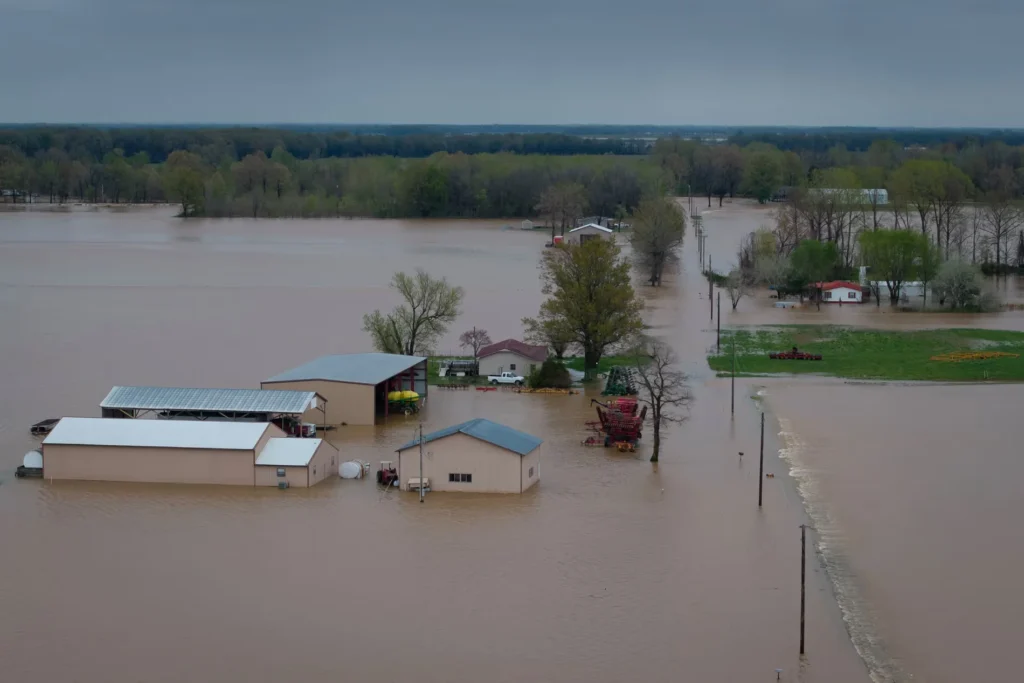US farmers warn of dire consequences from Trump’s tariffs, say more bailout funds are needed

Farmers across the United States are warning of financial ruin unless a substantial taxpayer-funded bailout is provided to offset losses caused by President Donald Trump’s sweeping budget cuts and erratic tariff policies. Small and medium-sized farms were already struggling with intensifying climate shocks and volatile commodity markets, further strained by the dominance of large corporations in the supply chain.
In recent weeks, farmers in Texas and the Midwest have suffered millions in crop losses due to unprecedented heavy rainfall and flooding—climate crisis-fueled disasters now made worse by trade wars and the targeting of crucial federal support programs. Travis Johnson, a farmer from the Rio Grande Valley (RGV), lost over 1,000 acres of cotton, sorghum, and corn after a year’s worth of rain fell in just 48 hours. “There’s a lot of uncertainty around, and I hate to be used as a bargaining chip. I am definitely worried,” he said.
RGV farmers depend on trade with Mexico for selling crops like sorghum, wheat, corn, and vegetables, while also relying on Mexican labor and imported farming equipment. But Trump’s tariffs have backfired—China, the biggest buyer of U.S. sorghum and cotton, now slaps a 125% tax on these goods, cutting farmers off from core markets. “No farmer wants this,” Johnson added, “but without a bailout, this could be devastating.”
Ironically, rural counties that heavily backed Trump in the 2024 election—averaging 78% support in farming-dependent regions—are now facing the brunt of his economic policies. Many farmers supported Trump despite his earlier trade war, which already required a $23 billion bailout in 2018–2019. Yet now, anxiety is mounting again.
Trump’s administration has made sweeping cuts to already underfunded federal conservation and climate programs aimed at improving yields and reducing environmental impact. He’s also dismantling local food initiatives that supported domestic farm resilience, including school lunch and food bank supply chains. The dismantling of USAID, which used to purchase about $2 billion annually in farm goods for humanitarian aid, is another major blow.
This turmoil hit just as farmers had planted spring crops or already invested in seeds and equipment, making it impossible to pivot to other viable crops. Experts say this chaotic approach gives rival agriculture economies a golden opportunity. “It’s a shock to the system,” said Ben Lilliston of the Institute for Agriculture and Trade Policy. “Tariffs are not magical—they need to be part of wider economic reforms.”

Economist Betty Resnick echoed this concern in Farm Bureau: “The volatility of the tariff policy…will take a toll. Without direct support, farmers will almost certainly bear the brunt.” Consumer advocate Ben Murray added, “Without a bailout, this is a massive opportunity for Brazil. And all for a tax cut for the wealthy.”
For decades, U.S. farm policy—especially the Farm Bill—has prioritized commodity exports like wheat, soy, and corn over produce for domestic consumption. Prices are tied to global markets, even when sold locally, while over 50% of fruits and vegetables consumed in the U.S. are now imported from Latin America. This system favors large corporations, while smaller farms struggle with boom-bust pricing, less access to subsidies, and credit. Each crisis—from the pandemic to this latest trade war—only boosts corporate profits while family farms disappear.
The Biden administration attempted to reverse some of this damage with modest reforms: anti-trust efforts, climate resilience investments, and local food system support. But nearly all of these efforts are now under attack. A $19.5 billion conservation fund from the Inflation Reduction Act is effectively dead. Two Biden-era food initiatives—the Local Food Purchase Assistance (LFPA) program and the Local Food for Schools Cooperative Agreement—have also been canceled, leaving smaller farmers scrambling.
“My farm will survive because we’ve worked with schools for 20 years,” said citrus farmer Anna Knight in Southern California, “but for others, the funding cliff is very real.” With no safety net, climate disasters, and foreign markets closing fast, many American farmers are left staring at the edge of collapse.



